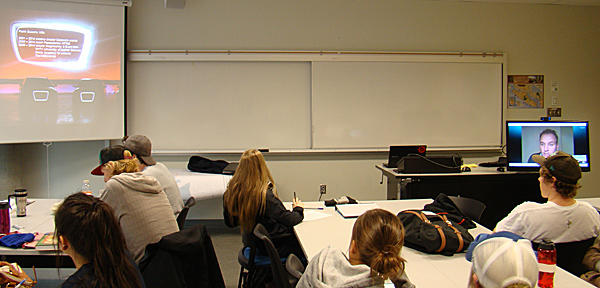by Olaf Ernst, Visiting Scholar, NHTV Breda University of Applied Sciences (Visiting Department of Recreation and Tourism Management, VIU)
 I have to admit: I am not a man of his time. To say it in another way: I missed the ‘digital’ boat, only being a passive user of Facebook and Linkedin, not connected to Twitter, refusing to buy a smart phone and gadgets are not my thing at all. For a guy who is in his thirties that is pretty old-fashioned I guess…
I have to admit: I am not a man of his time. To say it in another way: I missed the ‘digital’ boat, only being a passive user of Facebook and Linkedin, not connected to Twitter, refusing to buy a smart phone and gadgets are not my thing at all. For a guy who is in his thirties that is pretty old-fashioned I guess…
At the same time you need to live up with the standards of today at least a bit I think. Especially when working in an educational environment, where many of our ‘clients’ are totally immersed by everything modern media has to offer us nowadays.
It could help us to understand our students better and the tools they use –instead of telling them to put away their iphones while the execution of their homework assignment is on that same device.
The first time this happened to me a few years ago at my university back home in The Netherlands it made me realize how little I knew about these possibilities. However, in my opinion it goes further than that: recognizing all the digital devices is one step, it would be good though to use them in an appropriate way in class as well.
I know there is quite some controversy about this between supporters of e-learning and criticasters who argue this way of education is less meaningful. Like in many discussions I do not believe in black or white: the students of my home university do not really like the e-learning environment we have.
My first impressions of VIU is that D2L is equally unpopular….The feedback we get is that this system is complicated, not user friendly and not nearly as fast as Facebook. At the same time, an experiment we had with our students to organize the internal communication of a course via Facebook did not lead to unanimously positive feedback either.
Another example would be lecturing: at my own university we have separate lectures and seminars and the former are always recorded and webbed a few days later. Once we asked students to provide them with just weblectures, as ‘old school’ lectures might not be regarded as suitable for the present student’s needs, they were in favor of still attending them ‘live’ because of the bigger learning effect –although attendance of lectures is quite poor.
In the end I think you should always ask yourself whether the use of this new technology has an added value to your class. Of course it is nice to introduce all kind of new tools in class, but not just for being hip –to show your students you understand them (as we probably still not do anyway..).
A good example of something that works was a Skype lecture I organized with one of VIU colleagues last week. That particular class we would discuss a topic I thought would be totally fitting the expertise of a colleague of mine back home. He would be able to add something to this topic of Creativity and Innovation when planning and programming Special events. After having asked him and his positive reply, we needed to organize this Skype- and here the most important advice should be given: always test every single detail beforehand from a technical point of view.
Thanks to the help of our IT department we were able to tackle the few obstacles beforehand. And in the end we had a perfect connection with The Netherlands and an interesting lecture about concepting, provided by one of my colleagues.
So my advice is to not force yourself to use technology when there is no need to, but benefit from it if you see the extra value. And do not forget to contact your IT department, and that is something you can simply do with an old-fashioned medium: just call them!